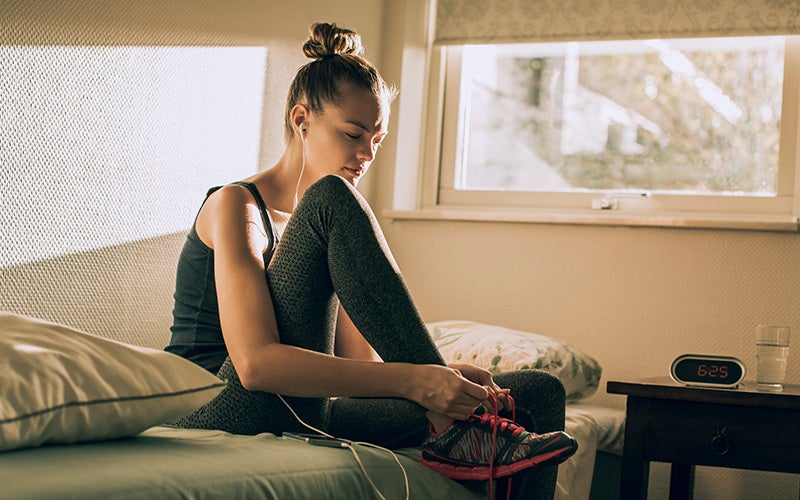Up with the sun? How to be an early bird
 ©Geber86
©Geber86
Early risers live longer, are more successful, and are generally happier, so they say. What are the real benefits of getting up earlier, and when is it better to stay in bed? We’ll show you how to be an early bird – just read on…
How do I become an early riser? And is it even worth it? The answer is both yes and no. The most important thing is that you find a sustainable way to successfully balance your internal clock and the rhythm of the rest of your life. So we’ve taken a look at how you can learn to get up earlier and still remain attuned to your internal clock.
What’s an early riser?
An early risers is popularly known as an early bird or morning lark. One who prefers later hours is called a night owl. Larks are the birds whose cheerful song wakes you up in the morning in that lovely, persistent way. Night owls on the other hand are nocturnal and prefer to spend the day sleeping –– they’re happiest during the night.
This black-and-white animal analogy cannot, of course, be translated perfectly to humans. Scientists have found out that about 20% of humans can be clearly assigned to one of the two chronotypes, “early risers” or “late risers.”
The remaining 80% are mixed types, displaying a little bit of both tendencies. It’s undisputed that there is an internal clock that essentially determines whether you get up in the morning full of energy after a restful sleep or whether you are more likely to enjoy the evening hours instead.
Which chronotype you are is, incidentally, independent of how many hours of sleep you need in order to be truly rested. You can be an early bird and need 8 hours and sleep from 9 p.m. to 5 a.m. or a night owl and need 6 hours and sleep from 4 a.m. to 10 a.m.
The fact is, when you are well-rested and refreshed, you are more focused, productive, relaxed, and regenerated. To keep it that way, you should treat yourself to mindful moments for yourself every day – for example, over a cup of tea.
Why are there late risers and early risers?
Late risers and early risers exist for two reasons: genetic predisposition and habit.
Your genetic chronotype determines whether you’re a lark or an owl. Your biological clock controls a complex system including your hormones, cardiovascular function, and metabolism. This complex system defines your day-night rhythm and your physical performance at different times of the day.
Various genetic differences between early risers and late risers have been scientifically proven. A study conducted at Jülich University has demonstrated that even the brain areas of both chronotypes differ.
As with everything in life, habit also plays a role. Your body adapts to your daily routine. Even as an early riser, you can get into the habit of going to bed around midnight and starting the morning later.
Social Jetlag: internal clock vs. social life
This habit-based, trained sleep-wake rhythm is by no means a rarity. Researchers have found out that in about 70% of people the circadian clock and the demands of social life are shifted by an hour on average.
This is especially true for people with conventional nine-to-five jobs, which often make a chronotype-specific individual rhythm impossible.
This all increases the probability of sleep problems. The more you learn to live with your own circadian rhythm, the better you sleep. Sleep problems can have many different causes. Look out for tips against sleeping problems that are better than counting sheep.
Whether you’re an early or late riser, in some social structures everyone has to keep to the same times. The resulting so-called “social jetlag” can have serious health consequences.
What happens when you fight your circadian rhythm
Transitioning from a natural late riser to an early riser is only a good idea within certain limits. If you work against your own internal clock too much, you expose yourself to a great deal of physical and mental stress.
Social jetlag increases your risk of being overweight and sleeping poorly. But good sleep is the basic prerequisite for muscle building and reducing body fat. Forcing yourself to adopt a lifestyle that does not suit you has no long-term benefit: You sleep worse and are subject to mental distress because you’re never really on form.
As a result, you’ll end up being less productive and more easily irritated. It’ll probably never feel harmonious. Sounds unpleasant, doesn’t it? We agree.
Tip: If you didn’t get enough sleep at night, or you feel lacking energy during the day, power napping actually helps.
#takehomemessage: Don’t force yourself to get up or go to sleep at a time that doesn’t suit you. Rather, shift your sleep-wake rhythm so that it fits the life you want. Find a way to balance your internal clock, job, hobbies, and social life. Yeah, you might have to compromise on something. But good sleep is definitely worth it.
The early bird gets the worm – Advantages of waking up early
To the dismay of the night owls and the delight of the early birds: standard daily routines are designed for early risers. If your alarm clock rings at 6:00, you’re in for a treat. Even if you’re waking up at 7 or 8 in the morning, you can still be considered an early riser. Any time later falls into the category of late risers.
Early rising is considered good for work
Early risers are welcomed in most industries. If you wake up early and know how to use the morning to your advantage, you’ll be busy and have your life under control –– such is the prevailing perception. This social acceptance makes it easy for larks to find recognition at work.
Yet it does the late risers an injustice. Studies show that larks and night owls have the same cognitive abilities and do not demonstrate any difference in intelligence and performance.
The only difference between early risers and late risers is the times when analytical, creative, and physical abilities are at their peak.
A survey by the Universitär Liège even showed that both groups are equally productive 1.5 hours after getting up. However, while the larks on average become tired after 10.5 hours on their feet, the night owls then experience a second energy kick.
Are you an early riser and want that same energy kick for your evening workout? No problem. With our Energy Aminos, you can get yourself up to full speed before you go to bed.

Our Tip: You should allow at least 3 hours after a strenuous workout before going to bed.
Getting up early can be part of your social life
While larks find morning activities easy, night owls often find it hard to get up so early in the morning that they have time for socializing at 5pm. Those who constantly have to force themselves to do something are more likely to be stressed out: A night owl might suffer more often from insomnia and depression than earlier risers because of greater social jetlag.
Early risers are less stressed
Larks have free time in the morning before life really gets going. Many people who wake up earlier have the time to exercise, follow a morning routine, or just have a coffee and relax on the couch.
Whatever it is, this morning freedom gives larks the opportunity to do something for themselves in peace. If you get that time in advance of your daily obligations, nothing can get in the way. On the one hand, this alleviates stress and mental pressure. On the other hand, this morning space also allows for deliberate relaxation. This in turn allows you to deal better with stress in everyday life.
Owls experience other things
So, if you wake up early, you might experience many (social) advantages, but let’s face it: nighttime is also fun. It’s quiet, in the countryside there’s a completely different environment, and in the big cities cultural and social landscapes open up that have no room during the day. The larks are often too tired for this life.
Even classic office jobs, which you can do as a freelancer in your home office on your own time, have a completely different character at night: no annoying e-mails, no WhatsApp, phone calls, or friends who want to have coffee with you. Pure productivity.
Becoming an earlier riser – 10 tips for getting up
“I just can’t wake up early” is hardly a good excuse. There’s a large gray area between sleeping until noon and jumping out of bed before dawn.
Anyone can become an early riser, and it’s all relative. At least within a certain range, you can get your body accustomed to a rhythm that suits your job and social life. No one says this has to be at 5:00 in the morning. Choose how to be an early bird in the way that suits you.
#1 Give yourself time
You will learn to get up earlier by getting used to it gradually. Push the time you get up a bit more each week. You normally get up at 9:30? Then get up at 9:15 for a week, 9:30 the week after, and so on. Adjust when you’re going to bed slowly.
#2 Decide when to sleep
First, define the time you want to get to bed. Find out how much sleep you really need. If you know that you need to sleep seven hours and want to get up at seven, you should go to sleep at midnight.
#3 Come to rest
Try going to bed at least half an hour before you want to sleep. Read something calming, do some autogenic training or just lie there – whatever helps you to leave the day behind.
Make sure you avoid blue light from your smartphone, laptop, TV, and other screens at least one, preferably two, hours before you go to bed. The light from displays prevents the production of the sleep hormone melatonin, which you need to get a good night’s sleep.
#4 Ditch the snooze button
Stop snoozing. As Yoda might have said: sleep or sleep not. There is no snooze. If you really like snoozing, allow yourself to set the alarm clock one more time for 10-15 minutes later. Then get up. But be careful: If you tend to start your morning in bed imagining how horrible your day will be, don’t let yourself snooze until you have your thoughts under control.
#5 Good morning, sunshine
Let daylight into the room, even if the sun isn’t shining. Daylight signals to your body that it is time to wake up and stimulates the production of the happiness hormone serotonin. It is also much gentler than the glaring bathroom light. In winter, a daylight lamp or a light alarm clock will help you through dark hours.
#6 Enjoy your morning
Getting up is hard when you have absolutely no desire for your first to-do of the day. So put a wanna-do in its place. Find a little activity first thing in the morning that you look forward to, no matter what it is and whether it takes 5 or 50 minutes. The main thing is that you enjoy doing it and that you are fully attentive. Maybe you even find something you think you’ll never have time for?
By the way: a lot of self-help books or guides might recommend that you make plans for after work that you look forward to. While this is generally a good idea, it can also be a source of stress. If you have to work late, your family or friends need you, or you’re simply exhausted after work, that might totally zap your excitement.
Maybe you’re even stressing yourself out just trying to make it to yoga, because that me-time is so important. But that’s not the right idea. 20 minutes of yoga in the morning in peace and quiet and being present is better than being stressed out for 90 minutes in the evening and thinking about work or dinner.
#7 Breathe in
Open the window first thing when you wake up and breathe the fresh morning air. Yes, even in winter. It’ll wake you up and give your brain the amount of oxygen it needs.
#8 Smile
Sounds cheesy, but it’s great: Smile at yourself in the mirror. Just the movement of the muscles when smiling already stimulates the production of serotonin. So it makes you awake and happy. Can’ t get any better than that, can it?
#9 Be consistent
In order for your body to get used to a rhythm, you have to follow it consistently. Keep to your time even on weekends and holidays. Nick Littlehales, sleep coach of top athletes, recommends that you choose a time to get up that works during the week as well as on weekends.
#10 Learn to use your internal clock
Find out which activities are easiest for you at which time. Use this knowledge to shape your working day. Can you work more analytically than creatively in the morning? Then do those kinds of tasks first. That way you get more out of your time. You will be happier at the end of the day, sleep better, and get out of bed brighter in the morning.
Are early risers more successful?
If you don’t get up at 4 a.m., will you never be destined for greatness? A look at the habits of successful people sometimes makes it seem so. Wrong. Albert Einstein was an avowed late riser. Amazon CEO Jeff Bezos and Bill Gates also like to sleep late.
Many morning larks are very successful, no question. Most of them are very well-organized, goal-oriented, and focused. Maybe this is also the reason for the success of famous early risers like Michelle Obama and Tim Cook.
Although there are studies that see a positive correlation between early risers and financial success in the workplace, there is no scientific evidence that early risers are generally more successful than late risers.
Ultimately, how successful you are depends on how focused and ambitious you are, and how often you prefer to let your inner slacker seduce you into lazing around.
And last but not least, it depends on what “success” actually means to you.
Summary
- Work with your internal clock, not against it.
- Find a rhythm of life that reflects your chronotype.
- Learning to wake up early is possible. Early is relative.
- Early risers are not always more successful than late risers.
Sources for this article
We at foodspring use only high-quality sources, including peer-reviewed studies, to support the facts within our articles. Read our editorial policy to learn more about how we fact-check and keep our content accurate, reliable, and trustworthy.
- Kristen L. Knutson & Malcolm von Schantz (2018) Associations between chronotype, morbidity and mortality in the UK Biobank cohort, Chronobiology International, 35:8, 1045-1053, DOI: 10.1080/07420528.2018.1454458.
- Roenneberg, Till et. al.: “Social Jetlag and Obesity” In: Current Biology. VOLUME 22, ISSUE 10,, 2012 May; P939-943.
- Rosenberg J. et al.: “Early to bed, early to rise”: diffusion tensor imaging identifies chronotype-specificity.” In: Neuroimage. 2014 Jan 1;84:428-34. doi: 10.1016/j.neuroimage.2013.07.086.
- https://www.colorado.edu/today/2018/06/15/early-birds-less-prone-depression
- https://www.sciencemag.org/news/2009/04/good-news-night-owls






















